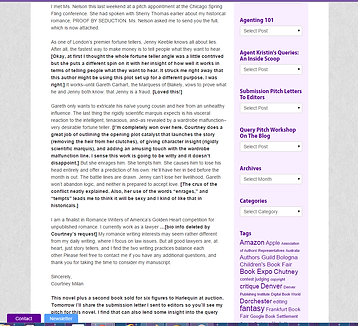Writing & Publishing
Search the website!
Tips and tools for a fresh author
Writing A Query Letter
While finding an agent is a hard part, you must also conquer the challenge of writing a query letter that will do its best to rope the agent into wanting your manuscript.
What is the point of a query letter?
A query letter exists with a major, larger part of description about the story sandwiched between a brief comment about the agent and a brief aside about any publishing experience that you might have had.
The letter will also be one of the first pieces of writing than an agent will see from you, so it serves not just to inform the agent about the manuscript but to also give an agent a taste of what your writing is like. It’s a sample just as much as it is a formal request.
Bottom line, a query letter is a very important step in the process of getting published.
How do I write a query letter?

The best way to learn to write query letters is to look up query letters that have already been successful. Some agencies even have pages on their blogs about query letters and what has been successful.
The Nelson Literary Agency is one such agency where there are archived posts with writers’ query letters, such as ones from Lisa Shearin and Courtney Milan. Other writers and other blogs full of writers’ resources will also showcase queries with annotations within the letter, such as Nathan Bransford.
While there is no single database for sharing this kind of information, spending some time looking around the internet for query letters should bring up some results.
Query letters should be short and sweet. The more succinct a query letter, the better it will sit with an agent that already has to read many query letters about potential books. As difficult as it sounds, don’t allow the length to get in the way of flaunting a personal voice in your writing.
Courtney Milan’s Query with Annotations
The Parts of a Query Letter
-
The first paragraph after the salutation or “Dear so-and-so,” should be about the agent. This is a way of recognizing them and what they are looking for in a book, include specific genres that they were interested in that your book may fit under. It’s also common to share how you found the agent.
-
The main body of the paragraph is all about the manuscript that you’re trying to push forward. For example, if the manuscript was a novel, it may be easiest to think of the description as something that would be found on the back of a book or on the inside of the cover. While keeping your own unique voice, tell as much as you can about why this book might interesting and hook the agent into wanting more of your work.
-
The last paragraph before you sign off, should be about yourself. It doesn’t have to be more than a few sentences, and could be as short as one. Keep in mind that if you have never published before or done anything with writing credentials, there is no shame in admitting it. Being honest and forthcoming is the best way to make a good impression with a potential agent.
Once the query letter is written, it is best to get a second opinion. Share the letter with a family member or a friend or anyone that is interested in helping you progress through the publishing process.
How do I send it in?
While many agents these days are accepting submissions in a digital format, it doesn’t hurt to check to the Submission Guidelines page. This page will sometimes include information about which agents are not looking for query’s as well.
On this page, there will be some sort of direction about where to direct your query. Some agencies will only have an email while some might have a physical address as well as an email. There may be a few agencies that only have a physical address. Respond accordingly to any and all directions on this page. This is the easiest way to help the agents that will read your query.

Pre-Submission Checklist
-
Is your query letter grammatically correct? Are all the punctuation marks in all the right places? Is everything spelled correctly?
-
Have you written the query letter to the best of your abilities and kept it relatively short?
-
Have you checked the Submission Guidelines page of your agent to double check what kind of extra information they want? Do they want a chapter of your manuscript?
-
Have you also checked to find out what kind of format your agent would like? Email or letter?
Submission Guidelines page from Ethan Ellenburg